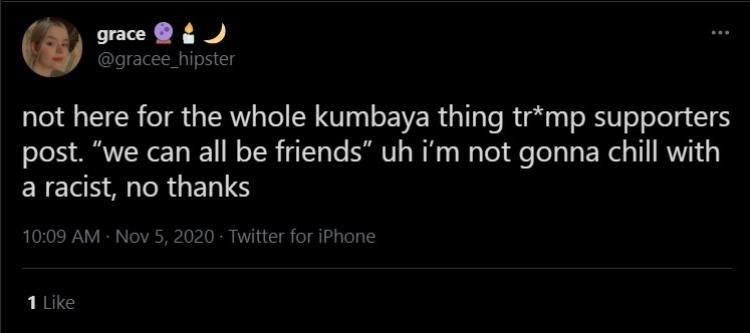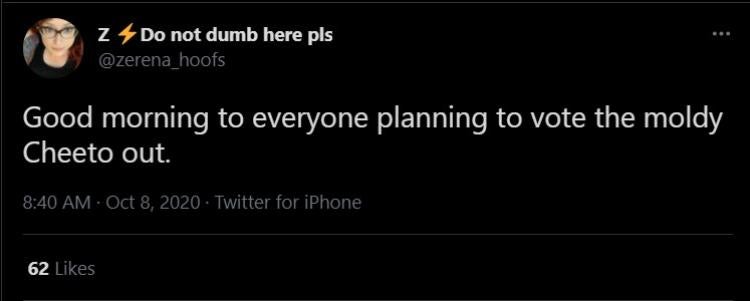Tr*mp: Creative Nicknaming on Twitter
Why do Trump-critical Twitter users routinely avoid using his name?
Noah Prior
LING 3800: Language in Digital Media
Advisor: Dr. Kira Hall
LURA 2021
Before and during his presidency, Donald Trump’s nicknames for his political adversaries were well known. Less well known are the nicknames his own critics have for him. These nicknames range from the more neutral, censored “Tr*mp” to the more openly offensive “Cheeto,” and are most easily found on Twitter, a platform Trump was infamously active on until his ban in early 2021. The usage of these nicknames is dually indexical (Hill, 2007), meaning they point to a quality about Trump that the user wishes to emphasize, but by doing so, they also point to a quality about the user. In most cases, these qualities can be generalized to Trump being incompetent or undeserving of office and the user disagreeing with Trump. Because Trump’s influence is tied closely with his status as a media personality and to his name, Twitter users’ nicknames are a way of calling the legitimacy of Trump’s presidential power into question.
Even before the 2016 election, Trump himself and the Trump name were synonymous with the excess of the super-rich. This personal brand that Trump has created has expanded to include intense versions of nationalism and so-called traditional American values since he began campaigning, but it still serves the same function: it indexes, or points to, the source of whatever it is attached to. Through this kind of recognition, Trump powered the cult of personality that led to his winning the presidency in 2016. This is why Trump’s name holds so much power, and why many Trump-critical Twitter users are resistant to using it.
In analyzing various Tweets, two types of nickname became evident. The first are the more neutral, genericizing names like “45,” “Tr*mp,” and “He-Who-Must-Not-Be-Named.” These tend to occur in less overtly critical contexts and mostly serve to, as much as possible, take focus off of Trump. His prevalence in media and highly polarizing politics have made even the mention of his name a potentially emotional and distracting act, so users who choose not to use it seem to be side-stepping that potential. “He-Who-Must-Not-Be-Named,” because it was originally a name for the villain of Harry Potter, carries a more critical connotation than either of the other two, although not all users of this nickname are necessarily aware of its origin. The censored “Tr*mp” is interesting because it does not actually avoid saying Trump’s name, but makes the Tweet in question unsearchable by the keyword “Trump,” so it deprives the name of its ability to spread. Also, because this type of censorship is common with curse words, it implies that Trump’s name is vulgar in a similar way.

https://twitter.com/gracee_hipster/status/1324398320912130050
The second type are the overtly insulting nicknames like “Cheeto,” “Drumpf,” and “[negative modifier] in Chief.” These are used in Tweets that are more clearly critical of Trump, often accompanied by negative adjectives like “moldy” and “racist.” “Cheeto” is a dig at Trump’s unnaturally orange skin; he is known to be sensitive about his appearance, so users of this nickname may be choosing it because they know it would be more likely to incite a reaction in Trump were he to see their Tweet. “Drumpf” was coined by late-night comedian John Oliver in 2016, an explicit attempt to re-brand Trump in a less flattering light. Oliver claimed the name is the un-Anglicized German version of the Trump family name, and encouraged his viewers to “make Donald Drumpf again” with merchandise and a Twitter hashtag. The construction “[negative modifier] in Chief” most clearly calls Trump’s executive abilities into question, as it directly references his job title and implies with the negative modifier that he is not competent at that job.

https://twitter.com/zerena_hoofs/status/1314214047584149505
Users of these nicknames have shown they are aware of the nicknames’ significance through metalinguistic discourse, or conversations about language, both on- and offline. A linguist named J. Lederer was quoted in one interview as saying, “people feel like not repeating his name is [a way of] not speaking to the brand and the value system that goes along with his political ideology” (qtd. in Limbach, 2017). Clearly, speakers have picked up on the importance of Trump’s brand and name to his success, and seek in their use of nicknames to undermine some of the power they have granted him.
Although the vocabulary of Twitter users may or may not have an appreciable effect on American politics, it does show how users view Trump and their own political power. Given that Trump used Twitter frequently during his presidency, it is understandable that many felt the need to oppose him on his own platform. These users, likely feeling powerless against an electoral system that brought someone they found so objectionable into power, turned to social media to gain some of that power back. Whether or not the use of Trump’s name on Twitter affected his actual power, users’ avoidance of it shows their refusal to do anything that might have the potential of bolstering Trump’s influence. Trump’s presidency was an unconventional one at best, so it makes sense that people would devise new strategies of opposition.
Works Cited
Hill, J. H. (2007). Mock Spanish: A Site for the Indexical Reproduction of Racism in American English. Language and Culture, Symposium 2. https://language-culture.binghamton.edu/symposia/2/part1/
Limbach, E. (2017, February 14). On Not Saying His Name. The Atlantic. https://www.theatlantic.com/entertainment/archive/2017/02/the-power-of-not-saying-his-name/516483/


